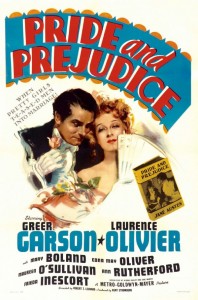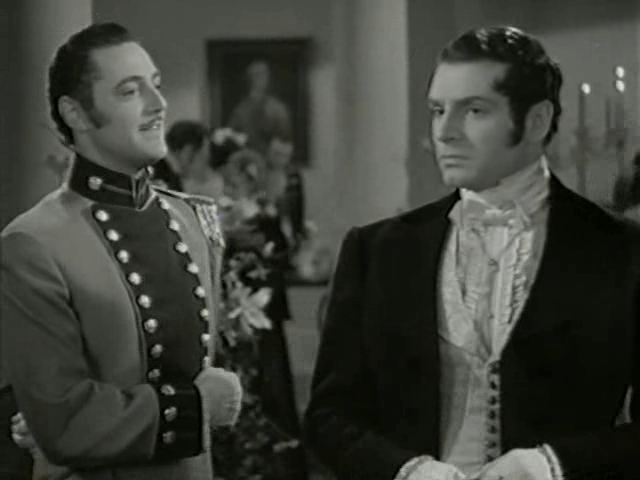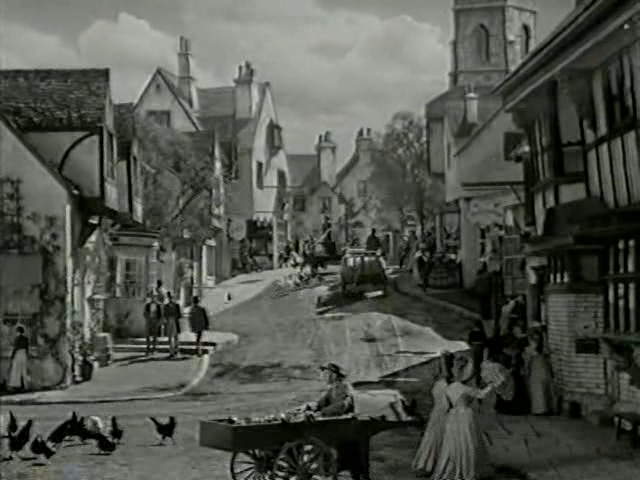|

Synopsis:
In 19th century England, the mother (Mary Boland) of five young women — headstrong Lizzie (Greer Garson), beautiful Jane (Maureen O’Sullivan), musical Mary (Marsha Hunt), and uniform-loving Lydia (Ann Rutherford) and Kitty (Heather Angel) — attempts to marry them off, given that a distant relative, Mr. Collins (Melville Cooper), will inherit their estate once her husband (Edmund Gwenn) passes on. Jane soon becomes infatuated with wealthy Mr. Bingley (Bruce Lester), while Lizzie fends off advances from Mr. Collins, and engages in heated discussions with a would-be suitor, mysterious Mr. Darcy (Laurence Olivier).
|
|
Genres, Themes, Actors, and Directors:
- Cross Class Romance
- Edmund Gwenn Films
- Greer Garson Films
- Historical Drama
- Karen Morley Films
- Laurence Olivier Films
- Looking for Ms./Mr. Right
- Maureen O’Sullivan Films
Review:
While literary fans may continue to quibble over the details of how Jane Austen’s beloved novels have been translated to the screen over the years, it’s generally acknowledged that this early MGM adaptation of Austen’s most beloved book deserves recognition as one of the best, and is notable for sparking a renaissance of interest at the time in Austen’s work. Despite the decision to place the story within a slightly later historical setting — and the inevitable truncation of various thematic elements from the novel — the film feels relatively faithful to the spirit of the book, merging more serious social concerns (a family will be forced to hand over its entire estate simply given lack of a male heir!) with plenty of levity, most specifically in the character of Mr. Collins (who is accompanied by his own musical motif whenever he enters the screen). The complex but never too-complicated plot — revolving around class relations, romantic infatuations, and hidden secrets of character — is portrayed in such a way that even modern audiences will be able to understand the nuances of life in Austen’s unique historical milieu.
Thirty-six-year-old Garson — fresh from her Hollywood debut in Goodbye, Mr. Chips (1939) — nicely inhabits the pivotal role of 20-year-old Elizabeth “Lizzie” Bennett, investing her with requisite amounts of intelligence and independence while simultaneously demonstrating her enduring loyalty towards her (often wacky) family members. Olivier, meanwhile, is suitably handsome and mysterious as Mr. Darcy — perhaps literature’s most desirable bachelor. Indeed, the central storyline of P&P — a seemingly arrogant millionaire turns out to have secret depths of compassion, generosity, and romantic desire — is so compelling that it’s nearly impossible not to get caught up in it. Meanwhile, the screenplay — co-written by none other than Aldous Huxley (!) — nicely preserves much of Austen’s witty, trenchant dialogue, respecting audience members’ intelligence and desire for authenticity:
Mr. Darcy: “She looks tolerable enough, but I am in no humor tonight to give consequence to the middle classes at play.”
Note: While Garson turns out to be nicely cast as Lizzie, one can’t help wondering what Vivien Leigh — Olivier’s original choice for the role — would have done with the character…
Redeeming Qualities and Moments:
- Greer Garson as Elizabeth Bennet (nominated by Peary as one of the Best Actresses of the Year in his Alternate Oscars)

- Laurence Olivier as Mr. Darcy

- Charming period sets (though the costumes themselves are too contentiously anachronistic to praise — see IMDb message boards for evidence of the ongoing debate)

Must See?
Yes, as an enjoyable literary adaptation. Listed as a film with Historical Importance and a Personal Recommendation in the back of Peary’s book.
Categories
Links:
|




One thought on “Pride and Prejudice (1940)”
First viewing. A once-must, as one of the better Hollywood adaptations of classic literature.
Since ‘P&P’ is, unfortunately, a novel I haven’t read, I had to ask around a little re: what some who had read the book think of this particular version. I discovered that several concur with what is brought out in the assessment – though I have read elsewhere that there are those who only grudgingly approve of what was done to Austen in 1940.
Fewer, no doubt, disapprove of the enormously popular 1995 BBC version – which I also saw. I remember hearing people going absolutely gaga over it – mainly for its faithfulness to the novel…and the yumminess of Colin Firth (tho I was personally immeasurably impressed by Jennifer Ehle).
But, no matter what, a film must always ultimately be seen as a thing apart. And, with that in mind, director Robert Z. Leonard’s version with Garson and Olivier is altogether pleasing and impressive as entertainment.
Garson is indeed charming as the glue of the piece. Olivier, surprisingly, turns in a commendable performance (largely because it’s not hammy). And Gwenn, I think, stands out admirably as the father in the female clan.
I was quite taken with the intelligence of the screenplay (overall; except when things become somewhat rushed near the end). Especially exchanges like the following –
Bingley: You have talked to me about all your friends in Meryton without saying one malicious word.
Mary: Oh, but they’re all such agreeable people, so kind and pleasant.
Bingley: That never prevented anyone from talking maliciously.
Kind of scary, really. An example like the above can almost make one forget that we’re in 19th century England and not present-day here in the midwest. 😉